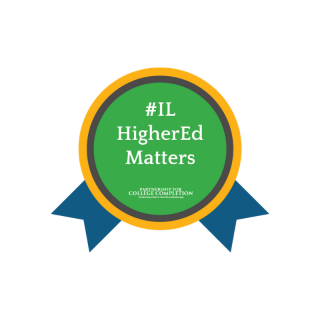Lisa Castillo Richmond, PCC Managing Director | May 19, 2020
While the coronavirus pandemic has wreaked havoc on daily life for people across the globe, it has also brought to light the best of humanity, perhaps especially within higher education. In recent weeks, Illinois colleges and universities have carried on their missions by deploying critical resources to aid in students’ ability to continue progressing toward degrees. It has become painfully clear how existing societal inequities in access to housing, food, healthcare, and employment have both been laid bare and exacerbated by COVID-19. Because of this, colleges and universities have mobilized overnight to continue academic programming, while working around the clock to meet the needs of those within their communities who have been most affected. It is because of Illinois’ diverse and expansive higher education system that the state’s pandemic response has been so comprehensive, with resources deployed so quickly and efficiently to all corners of the state.
The speed with which everything changed was dizzying. Closing campuses, which seemed unthinkable at the start of the semester and unlikely one month later, became inevitable by the beginning of March. Institutions, many of which offered very few courses online at the time, moved all their instruction and programming to a virtual environment in the matter of a week. Upon campus closures, students dispersed across the state and beyond, often facing new financial and environmental challenges that affected their learning. Technology had to be acquired, learned, and deployed with changes communicated to thousands. Gatherings of all kinds were postponed and canceled, while institutional policies had to be reconsidered. Through it all, our colleges and universities made it happen. Classes were convened virtually, coursework was completed, students advanced and many, now, have graduated.
But what happened in the classroom was just the beginning. Today, our colleges are not only expansive institutions of higher learning, but also significant providers of an array of social services and basic needs for students and their families. Institutions organized to increase access via telehealth services, supporting students with food insecurity through drive-thru food pantries, and continuing to pay student workers through the end of the academic term. They deployed emergency funds to cover rent, groceries, lost income, and costs associated with shifting to virtual learning, while giving out thousands of laptops, tablets and WiFi hotspots to support student connectivity and access to course materials.
Read some of the IL Higher Ed Matters stories below:
Amid this pandemic, we’ve also seen how the work and responsibility of higher education extends beyond the confines of the campus into their neighboring communities, where they provide solutions and create knowledge broadly. Advanced manufacturing equipment and 3-D printers were used across colleges and universities to produce personal protective equipment for healthcare providers. Supplies and meals were donated. New programs were launched to train Illinoisans for jobs that would be created to enable citizen movement after lockdown and prior to widespread vaccination. Thousands of faculty and alumni from dozens of institutions are working in medicine, immunology, epidemiology, infectious disease, public health policy, and other disciplines in hospitals, clinics, labs, and statehouses across the country. They are architects transforming spaces for public health purposes. They are scholars, contributing research that helps identify the many ways in which we can move from lockdown and shutdown to recovery and a more equitable society.
Illinois’ colleges and universities will be at the forefront of that recovery. They will be the places to which Illinois’ students return, and where the state’s workforce turns to reskill or upskill for the jobs of tomorrow. They will be where breakthroughs are produced that will improve the lives of citizens. They will be places of investment, where science, innovation, and imagination will be used to limit the impacts of the next pandemic. Illinois’ economic recovery depends on a healthy, thriving, and diverse network of colleges and universities that is accessible and affordable to all, and that extends from Rockford to Carbondale and from Quincy to Chicago. #ILHigherEdMatters


